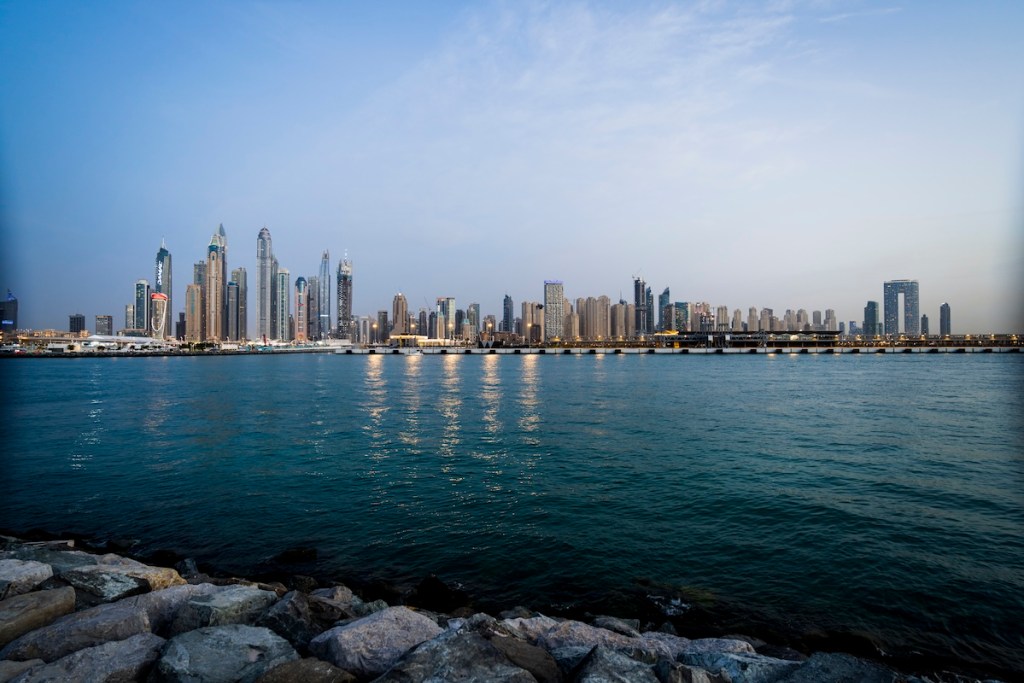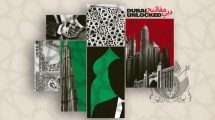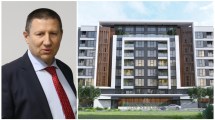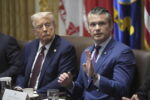From the 37th floor of Dubai’s tallest skyscraper, the wife of an alleged Bosnian member of a criminal cartel posted video after video on TikTok of the couple’s elegant rental apartment, often featuring their gray cat.
The images provided enough clues for reporters to identify the exact location of the apartment in the city’s iconic skyscraper, Burj Khalifa. But also to establish the fact that he belongs to another target of law enforcement: Cândido Nsué Okomo, the former head of Equatorial Guinea’s infamous state oil company, which is being investigated for money laundering in Spain. Okomo is also the son-in-law of longtime President Teodoro Obiang Nguema Mbasogo, whose family has been accused by French prosecutors of looting the African country’s public resources, which are heavily dependent on oil revenues.
It is unclear whether tenant Janice Kadrić and his landlord Okomo knew about each other’s alleged misdeeds. But their convergence in a lease is emblematic of modern Dubai, where secrecy and years of shutting the eyes of authorities have populated the city’s properties with owners with bad reputations.
James Henry, a justice associate at Yale Global and an expert on tax havens, likened the United Arab Emirates — a federation of seven emirates, including Dubai — to a “Star Wars bar scene.”
“You go in, you see the kleptocrats, the oligarchs on the left, the money launderers in the middle, and the dirty Russian commodity traders in the back, who use it as a sanctions loophole,” Henry said. “They are all served by the same basic financial secrecy.”
In the case of Okomo’s high-rise apartment, reporters from OCCRP’s Serbian partner KRIK first used TikTok videos to link the property to Kadrić, a former police officer who was arrested in Bosnia in February on suspicion of involvement in organized crime, drug smuggling, and money laundering. He was released in May but continues to be investigated.
Geolocation specialists from the Bellingcat investigative center then used the videos to identify the specific apartment. Okomo’s ownership was confirmed by a 2023 lease agreement and its entry in a portion of leaked ownership data.
Okomo isn’t the only owner accused of crime that reporters found in the leaked data: after a six-month investigation led by OCCRP and Norway’s outlet E24, reporters uncovered dozens of convicted criminals, fugitives, political figures accused of corruption or their collaborators, and sanctioned individuals who owned at least one real estate in Dubai.
For example, not far from the property in Burj Khalifa, Okomo has an apartment in the Burj Lake Hotel, owned by Shwan Mohammad Almulla, a Iraqi-born British citizen who was charged in the US in 2021 with a bribery scheme to receive millions in contracts for the reconstruction of Iraq.
Down the coast in Grandeur Residences, a building on Dubai’s palm-shaped artificial archipelago, there is a property belonging to Joseph Johannes Lydeckers, 32, also known as “Chubby Jos,” who is on the European Union’s most wanted list for alleged drug trafficking.
And in the nearby Palm Tower Dubai is an apartment owned by Danilo Vunhao Santana Gouvea, a Brazilian businessman accused of money laundering and fraud for allegedly running a massive bitcoin pyramid scheme in his home country. After that, he began a career as a musician in Dubai, which he described in detail in Instagram account along with photos of him posing in front of various venues in the city, including the canvas-shaped skyscraper Burj Al Arab Jumeirah.
These and many other property owners vetted by OCCRP and its partners should have immediately raised a red flag for the authorities at any elementary risk assessment. Yet none of them were apparently prevented from buying properties in their own name. (Kadriç, Okomo, Almula, Leideckers and Santana Gouveia did not respond to requests for comment.)
The leaked data, which is mostly from 2022 and 2020, was originally obtained from the Center for Advanced Defense Studies (C4ADS), a nonprofit organization in Washington, D.C., that researches international crime and conflict. The leak was then shared with the Norwegian financial agency E24 and OCCRP, which coordinated Dubai Unlocked, a global investigative project involving journalists from more than 70 media outlets.
Reporters used the data as a starting point to explore the landscape of foreign ownership in Dubai. They spent months verifying the identities of people who appeared in the leaked data, as well as confirming their ownership status using official records, open-source research, and other leaked datasets.
From Australian cocaine traffickers to relatives of West African dictators and a cohort of sanctioned Hezbollah financiers, the revelations show how the city has opened its arms to unscrupulous heroes from around the world.
“Corrupt actors and political figures who avoid public accountability use secret jurisdictions such as the UAE to hide assets in plain sight,” said Maria Giudita Borselli, portfolio manager at C4ADS.
UAE officials — including in the interior, economy and justice ministries — and Dubai police did not respond to detailed questions, but the country’s embassies in the U.K. and Norway sent a brief response to reporters saying the country was “taking its role and defending the integrity of the global financial system extremely seriously.”
“In the ongoing pursuit of global criminals, the UAE is working closely with international partners to thwart and deter all forms of illicit financing,” the statement added. “The UAE is committed to continuing these efforts and actions more than ever today and in the longer term.”
Why Dubai?
Forty years ago, Dubai was a nondescript outpost in the Middle East, where a sandstorm could pass almost unhindered from the Arabian desert to the Persian Gulf.
Today, it is a global financial center that boasts one of the most recognizable horizons in the world – a futuristic steel jungle where business leaders make billions of dollars worth of deals, influencers lead luxurious lives, and the world’s tallest building is the stage for a blockbuster with Tom Cruise.

The Gulf city is far from the only place where criminals and others have successfully hidden their wealth in luxury properties. Real estate in New York and London is also known to attract dirty money.
But experts say Dubai has a lot to offer, and not just in terms of its vast array of skyscrapers and high-end villas. One of the attractive factors is the inconsistent response of the authorities in the emirate to requests from foreign authorities for assistance in the arrest and extradition of fugitives.
Until recently, the UAE did not have extradition treaties with many countries, which has helped make Dubai a magnet for refugees from all over the world. Although UAE authorities have stepped up cooperation with foreign law enforcement authorities in recent years, the government is still known for its inconsistent responses to extradition requests.
The Indian-born Gupta brothers, who are accused of looting South Africa’s public funds through their close ties to the country’s former president, Jacob Zuma, set a fresh example.
Despite the extradition treaty between the two nations, the UAE last year quietly rejected South Africa’s request to extradite Atul and Rajesh Gupta, who face charges of money laundering and fraud. The move shocked South Africa, where authorities said the UAE had not provided “satisfactory answers” about the reasons for the rejection.
A UAE official did not respond to specific questions about Gupta but said he was “working closely with international partners to disrupt and deter all forms of illicit funding.” The Gupta and Zuma families did not respond to requests for comment.
According to Radha Sterling, a lawyer and human rights advocate who runs the legal aid organization Detained in Dubai, UAE authorities are using high-profile fugitives as a “bargaining chip”.
“The existence of extradition agreements between nations is not necessarily key to whether people will be extradited or not,” she said. “What matters is what Dubai wants in return and whether that nation has anything it wants enough to exchange.”
Asked about the country’s record in terms of extraditions, Sawod Abdulaziz Almutawa, the head of the Dubai Police’s Financial Crimes Centre, highlighted the recent arrests of red-label individuals and said extradition requests that must go through local courts take longer to process and often face challenges from deep-pocketed legal defence teams.
“We are increasing our capacity, increasing and developing our resources… to meet the expectations of our foreign colleagues,” he added in an interview with Swedish television (SVT) in March.
Exiting the “grey list”
Emirati authorities have tightened anti-money laundering regulations in recent years, especially after the Financial Action Task Force (FATF), the intergovernmental anti-money laundering organization, added the UAE to its “grey list” in 2022 for failures to effectively combat illicit money flows. After reportedly lobbying to be removed from the list, the Emirati authorities were rewarded with good news in February: The FATF recognized the UAE as “significant progress” and cleared it of further monitoring.
But some experts warned that the move was premature or motivated by geopolitical concerns.
“Recent reforms to the penal code and judiciary may have been enough to pull Dubai off the FATF’s grey list this winter, but they haven’t fundamentally changed the nature of the real estate market,” said Colin Powers, senior fellow and editor-in-chief of the Noria MENA program, an independent nonprofit research organization.
The reforms do not “change what makes the real estate market so attractive for storing wealth,” he said, citing buyers’ ability to hide their ownership behind trusts, holding companies and foundations.
An undercover consultation with a property seller from Dubai’s leading real estate development firm Damac in March suggests that there are still some brokers turning a blind eye when it comes to the origin of their clients’ funds.
On a tour of a Damac property, the seller told Swedish Television (SVT) reporters that they could buy the apartment with “bags of money” or cryptocurrency and there were “no questions” about the source of the funds.
“You will not be questioned about the properties by any department… especially by the entrepreneur himself,” said the seller. “Anyone who wants to buy can buy.”
He also described how real estate purchases in cash are a way for customers to avoid questions from banks about the source of their money.
“If you sell the property and then transfer the entire amount to the bank account, then there is no problem, you will not be questioned where you get the money from to buy the property and then deposit it in the bank,” he said. said the seller.
Contacted for comment later, a Damac representative said the firm conducts background checks on its customers and that it is not the company’s policy to recommend customers to buy cash.
“If your undercover reporter had gone further through the sales process beyond a simple first meeting with a seller, they would have witnessed the scrutiny and enhanced measures we apply to transactions that raise red flags,” Damac said, adding that the seller’s statements would have been investigated.
When told about the incident, an officer from the Dubai Police’s Anti-Money Laundering Unit, Sawod Abdulaziz Almutawa, said the emirate had “zero tolerance for the risk of non-compliance” and that action was being taken against those who “turned a blind eye” to the law.
“Dubai is not a safe haven for illicit funds for illicit actors. Dubai is a safe haven for legitimate trade, for legitimate people who are hardworking and have earned what they otherwise have,” he added.
Melissa Sequeira, a customer service manager at Themis, a UK and UAE-based firm that helps clients manage financial crime risks, praised Dubai’s stricter enforcement and increased checks on brokers in recent years. But she noted that land-level change is still a work in progress, especially among smaller firms with limited resources, in a sector where just a few years ago “you could only buy a property with a passport.”
The goal is to change “the tone of senior executives who are more focused on profit than on stopping the global financial negative impacts of crime,” Sequeira said.
As for removing the UAE from the FATF’s “grey list“, Jody Vitori, a professor at Georgetown University who studies corruption and illicit funding, suggested that the current war in the Middle East could be a factor. As the U.S. hopes the UAE and other allies in the Middle East will help with the difficult task of rebuilding Gaza, channeling funding through a country marked by the FATF could be seen as untenable.
“The UAE’s facilitation of corruption, money laundering and organized crime undermines larger Western efforts to combat everything from fentanyl to human trafficking to illicit financial flows,” Vittori said. “But it will be difficult for Western governments to ask the UAE to rebuild Gaza and at the same time put pressure on the FATF to put the UAE back on its grey list for money laundering or otherwise sanction it.”
From OCCRP and E24. Lead photo/collage: James O’Brien/OCCRP
Journalists from 75 media took part in the project “Unlocked Dubai“. Together with OCCRP and E24, they are: Africa Uncensored, Age and Sydney Morning Herald, Al Jazeera, AZDA TV, Belarusian Investigative Center (BIC), BIRD.BG, Buro Media, Civilnet, Context Investigative Reporting Project Romania, Cyprus Investigative Reporting Network, DARAJ, Dawn, De Groene Amsterdammer, De Tijd, Delfi, Der Spiegel, Der Standard, Diario Rombe, Direkt36, E24, Economy Post, El Universal, Etilaat Roz, Expresso, Forbes, Frontier Myanmar, Frontstory.pl/Reporters Foundation, Government Accountability Project, InfoLibre, inside story, International Consortium of Investigative Journalists (ICIJ), Investico, investigace.cz, Investigative center of Jan Kuciak, Investigative Reporting Lab – IRL, Irish Times, IrpiMedia, iStories, Knack, Korea Center for Investigative Journalism (KCIJ) – Newstapa, KRIK, Le Monde, Le Soir, Lighthouse Reports, Malaysiakini, Malta Today, Mikroskop Media, NIRIJ, Organized Crime and Corruption Reporting Project, Oštro, paper trail media, Rappler, Reporter.lu, Schemes, RFE/RL’s Ukrainian service investigative project, Shomrim, Siena, SIRAJ, Slidstvo.Info, Straits Times, SVT, Tempo, The Age, The Confluence Media, The News International Pakistan, The Nikkei, The Sydney Morning Herald, The Times, Times of Malta, Twala, VG, Vlast, Yle, Zamaneh Media, ZDF
Comment from the editors of BIRD:
BIRD.BG also participated in the previous international journalistic project called “The Dubai Revelations”. It became clear that more than 240 Bulgarian citizens and residents of Bulgaria own properties worth over $ 160 million in Dubai. The most famous among them are Irena Krasteva – the mother of MP Delyan Peevski, the construction boss Veliko Zhelev, the sister of Deputy Prosecutor General Borislav Sarafov, the builder of our pavilion for Expo 2020 in Dubai Ralitsa Ivanova, the sisters Gergana Simova and Elitsa Proshenska, the underground boss Radostin Barzanov – Rado the Sun, an aver of Taki and Vasil Iliev and the owners of First Investment Bank (FIB), Tseko Minev and Ivaylo Mutafchiev. The publications from the series “The Dubai Revelations” provoked inspections by the NRA, which ended with a measly result, if you do not count the fact that the head of the NRA himself, Rumen Spetsov, also acquired a property there for more than 1 million euros. Lv.
In the new data from the “Unlocked Dubai” investigation, new names of famous Bulgarians appear, which we will inform about in separate publications in the coming days and weeks.
Материалът Unlocked Dubai: How Dirty Money Finds a Home in Dubai Real Estate е публикуван за пръв път на BIRD.














